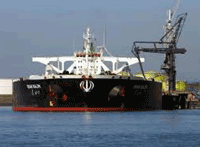
Less Iranian oil passing through Suez
Dubai, May 22, 2012
The number of Iranian crude vessels passing through Egypt's Suez Canal has dropped this year as Western sanctions bite, an official from the Suez Canal Authority said on Tuesday.
'I can say there's been a 5-6 per cent drop in Iranian crude since the first of January,' Sayed Mariee, deputy director of planning, research and studies at the Suez Canal Authority, told Reuters on the sidelines of an industry event on Tuesday.
He added that Egypt will continue to allow Iranian vessels to use the Canal even after July, when the European Union fully moves ahead with an embargo on Iranian crude.
'These sanctions are by Europe and the US, they're not sanctions from Egypt,' said Mariee. 'There's no discrimination. Iranian tankers pass through Suez, Israeli tankers pass too.'
Escalating sanctions on Iran's key energy exports are designed to lift the veil on Tehran's nuclear energy development which western powers suspect is a front for work on atom bombs.
Asked if Iran was still using the Sumed pipeline connecting the Red Sea to the Mediterranean to transport its oil, Mariee said that it was but he was not certain if volumes had dropped.
The 2.3 million bpd Sumed pipeline is filled with 65 per cent Saudi crude, 25 per cent Iranian and 4 per cent Kuwaiti.
This year revenues from the Canal, a vital source of foreign currency for Egypt, was expected to increase slightly to $5.4 billion from $5.3 billion a year ago, said Mariee.
'The problem is not in the container business. But we have some challenges, we have competition from other routes like the Panama Canal and North Sea.'
The Suez Canal Authority increased the toll for vessels by 3 per cent in March and Mariee played down prospects for a further rise.
'Our philosophy is not only boosting revenues but also increasing the number of clients and the number of passenger ships,' he said. 'The Suez Canal must be the cheapest way of transportation.'
Mariee said the authority was looking at increasing revenues by expanding its fuel bunkering base.
'But we have a shortage of (fuel). One alternative is to import from Yanbu (Saudi Arabia),' said Mariee, adding that the plan was to increase bunker quantities from 3 million tonnes annually to 8 million tonnes.-Reuters







